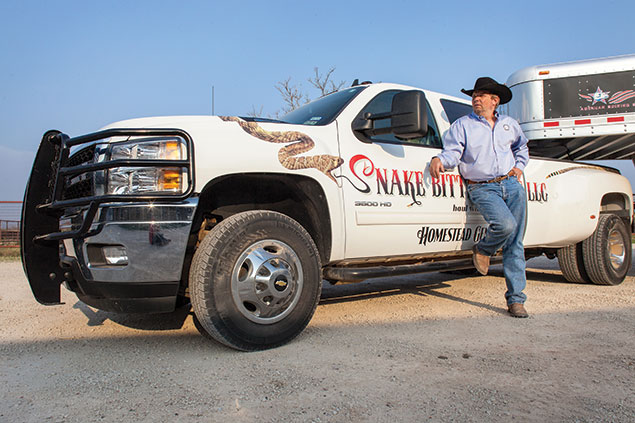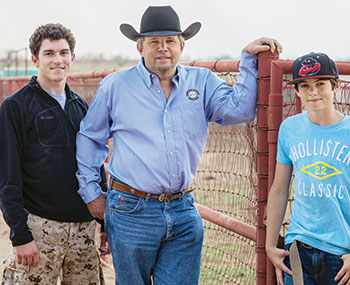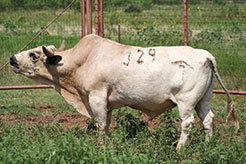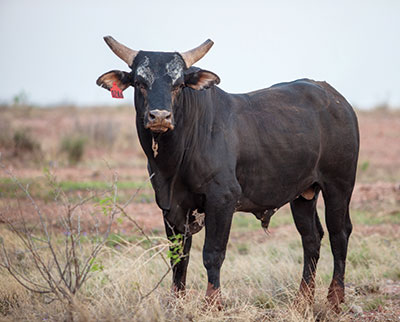
Bucking bull breeder Gene Baker
Photo by Russell Graves
When Gene Baker talks about building a team of tough athletes, selecting the top performers and coaching them to peak performance, you might think he's referring to professional ballplayers.
Instead, he's describing his business of breeding professional bucking bulls.
“It is kind of like being a coach,” says Baker, who owns Homestead Genetics of Anson, Texas, a full-service artificial insemination and embryo transfer business specializing in rough stock bulls for the bucking bull industry. “I make all of the decisions about the exercise program, like when to exercise, and what to feed them, and when to buck them or hold them back.
“It's really challenging to get the right bull in the right spot and then find success,” he comments.

Gene Baker, center, with sons Colt, left, and Cade
Photo by Russell Graves
And just like in coaching any professional sport, your reputation is only as good as your winning record.
Baker has a long record of wins dating back almost to 2002. That's the year that he and his wife, Paige, and their sons, Colt and Cade, started raising bulls for the rodeo industry. Situated on a former horse farm, the operation is atypical among the cotton farms and mesquite-dotted beef cattle ranches in this Rolling Plains region, north of Abilene.
Although he wasn't reared in the cattle business, Baker developed a passion for rodeo during high school in Abilene. After earning a degree in finance from Hardin-Simmons University, he set his sights on the rodeo arena and competed as a professional calf roper for 10 years. Meanwhile, he fostered an interest in livestock genetics by breeding and selling cattle for stock shows. In 2002, he phased away from show cattle and began concentrating on bucking bulls — specifically futurities.
Focus on Futurities
A futurity is a program in which breeders nominate outstanding 2-year-old bucking bulls from their herds. The futurity bulls compete in a riderless bucking contest that is scored by judges. Each judge scores on a different element, including the height of the buck, the extension and snap of the kicks, the amount of spin a bull exhibits, the amount of effort it displays, and the degree of difficulty that the bull shows in his bucking.
When all elements are combined, a bull can earn up to 25 points per round in a futurity. With futurity wins, breeders earn credibility in the industry and see increased demand for their stock's bloodlines, which explains the popularity of Homestead Genetics' lineage.
More Than 60 Championships
Over the past decade, Homestead Genetics has won more than 60 championships. The company also has been a three-time winner of the American Heritage futurity — the premier futurity event hosted each year by the industry's leading bloodline registry and organized by American Bucking Bull Incorporated (ABBI).
"Taking a 2-year-old and getting him ready for competition and then performing at the highest level, knowing that I had something to do with that, is very rewarding.” - Gene Baker
In 2010, Baker also owned the reserve champion Professional Bull Riders' (PBR) classic bull, and in 2011, he owned two of the top-ranked futurity bulls in competition.
Futurities, he says, continue to be his competitive focus.
“A lot of people like futurities. People like to mess with the 2-year-old bulls because they are easier to work. As bulls gets older, they become a little more aggressive and a little harder to deal with,” he explains.
Baker hauls bulls to 20 futurity events a year, selling them before they become 3-year-olds. Typically, the animals find homes with rodeo companies and stock contractors who provide bulls for rodeos and bull-riding events across the country.
Secrets to Success
Baker believes his success started when he bought his first cow. At $1,500, she seemed expensive to him. Soon, though, she birthed a calf that went on to win first in a futurity. With the success of the bloodline proved, the cow and her offspring were worth significantly more.
“It starts with the breeding process. My favorite aspect of the business is deciding what bulls match a specific cow and trying to do something with the offspring,” Baker says.
Keeping pedigrees on bucking bulls and their dams was simplified when legendary rodeo announcer Bob Tallman organized the ABBI registry in 2002. With the registry, the bucking bull business grew, because breeders could document a proven pedigree and choose new bloodlines that would allow them to introduce superior characteristics into their herds.

Houdini
Photo courtesy of Homestead Genetics
Celebrated Bulls
During his time in the industry, Baker has owned one of the bucking bull industry's most celebrated bulls — Houdini 329, a prolific and influential sire.
He and a partner bought Houdini in 2006, and the animal soon proved his mettle as a breeding animal. He sired bulls that won multiple futurities and breeders cup championships and was the Professional Rodeo Cowboys Association bull of the National Finals Rodeo. All told, Houdini's offspring have earned more than $5 million in competitions. He died peacefully at home in 2012 at age 19.
While Baker and the bovine bloodlines he's developed have seen a huge amount of success, he confides that the business is tough.
“It's a challenge from year to year, because there are a lot of guys in this business trying to win,” he says. He explains that the unforgiving nature of the business dictates a breeder's bulls have to be exceptional and perform consistently. Just because you are on top one day doesn't mean that you'll be a legendary breeder.
“Being in the cattle business is one thing, but being in the bucking bull business is another. It's not for the faint of heart,” he says. “You may have a great bull that costs a lot of money, but there are no guarantees.”
Still, it's a livelihood that melds perfectly with his competitive spirit and his love of cattle genetics.

Photo by Russell Graves
“I love doing what I do because of the competitive side of me,” he says. “Taking a 2-year-old and getting him ready for competition and then performing at the highest level, knowing that I had something to do with that, is very rewarding.”
Navigating the Business
Baker hedges the inherent risk in the business with a lending partner, Capital Farm Credit, who understands the rodeo stock business.
“The thing about Capital Farm Credit is that the guys who make decisions know what you are going through. They work hard to understand your capabilities and are flexible,” Baker says.
Randy Riley, vice president of lending in Capital's Stamford credit office, has known Baker for nearly three decades. “I first met Gene back when he was in high school,” says Riley. Even then, he says, Baker's passion and enthusiasm for livestock was impressive.
“Gene is very knowledgeable and does a tremendous job. With his knowledge of embryo transfer and artificial insemination, he's been able to jump leaps and bounds in the bucking bull business. As a customer, he's been a good one,” Riley says.
Ultimately, Baker doesn't want the bulls to define him, however.
“I don't want the bulls to be my legacy,” says Baker. “I try to be useful with my time and help people. I want to be known for my benevolent side, rather than my competitive side.”
-Russell Graves
Baker Family Aids Tanzanian Farmers
A passion for people and livestock spans multiple generations in the Baker family. Gene Baker and his dad, Pete, use cattle as the vehicle to support two international humanitarian efforts.
In 2009, Pete and his wife, Suzie, visited Tanzania, where they discovered a need to help farmers.
“While we were there, I noticed that people's primary source of food was cattle — which isn't out of the ordinary. However, the strange thing is that there were mostly cows and not many calves,” Pete says.
Thinking the age ratio was unusual, he researched the reason for the low calf numbers. What he learned was astounding. In wet years, as much as 90 percent of the Tanzanian calf crop is wiped out by East Coast Fever, or ECF. Caused by a protozoan parasite and passed on by ticks, the disease results in nearly 100 percent mortality in infected herds.
When Pete and Suzie learned about it, they wanted to help. Pete reached out to Dr. Lieve Lynen, a Belgian-born veterinarian who is working with Maasai tribal leaders to combat the disease.
“She does the heavy lifting,” he says. “We just try to support her financially, so she can help the Maasai.”
With contributions from their local church and other generous donors, the Bakers send funding to the veterinarian so she can visit Tanzanian families and vaccinate their cattle herds. And each year, Gene designates a yearling bull at his annual Homestead Genetics livestock sale and donates the proceeds to the ECF project, known as Omega Mission International.
“Our thought is that if we can help get their cattle healthy, the Maasai people are better able to help themselves,” Gene says.
In addition, the Bakers invite customers to join them in sponsoring a needy child through One Child Matters, formerly Mission of Mercy. For every $408 donation to the organization, customers receive 10 straws of semen from each of two different Homestead bulls, for a total of 20 straws.
To learn more about Homestead Genetics and their international aid efforts, visit, homesteadgenetics.net.